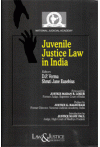- Author(s): D.P. Verma, Shruti Jane Eusebius
- Publisher: Law and Justice Publishing Co
- Edition: Ed 2024
- ISBN 13 9788197061219
- Approx. Pages 260 + contents
- Format Hardbound
- Approx. Product Size 24 x 16 cms
- Delivery Time 3-5 working days (within Kerala & South India) (Others 7-9 days)
- Shipping Charge Extra (see Shopping Cart)
.........................................................................................................................
Description
A narrative of juvenile justice system in various countries reveals a shift from the welfare-based standard to the punitive model for dealing with juvenile offences. In these models, the juvenile justice arrangement has resulted in its stigmatizing and exclusionary effect upon the youth. It is sad that there are always systemic problems that cause flagrant violations of human rights of children and young persons, despite compliance of human rights norms extending all over juvenile justice. These abuses take place despite a strong framework regulating human rights protection of the juveniles. As an alternative to restrain and response to delinquency, a rights-based perspective on juvenile justice was introduced with the coming into force of the UN Convention of the Rights of the Child, in 1990.
Statistics of the number of children behind bars around the world is not known, but more than one million children, according to the United Nations Children's Fund (UNICEF), were behind prisons. They were languishing in prison, in several instances for extended period of time. Such children offen suffer cruel and inhuman conditions; are deprived of education, access to essential activities, and regular contact with the outside world. The United Nations desires that international standards be complied with and the number of children deprived of liberty be reduced. To ensure that children are deprived of liberty only as a last resort, governments are expected to provide alternatives to detention. In juvenile justice, these alternatives include enabling children the benefits of probation, mediation, counselling, community service and other facilities.
........................................................................................................................
Contents
Part 1. Jurisprudential Context
1. Development of Juvenile Justice Law (International and National) with Particular Reference to Juvenile Justice Act, 2015
2. Jurisprudence of Juvenile Justice: A Human Rights Perspective
3. Parens Patriae and Role of the State under Juvenile Justice Law in India
Part 2. Critical Analysis of Recent Developments
4. Juvenile Justice (Care and Protection of Children) Act, 2015: A Critique
5. Child in Conflict with Law - Recent Developments
6. Juvenile Justice: The Drivers of Discourse and Law
7. Contemporary Issues and Challenges in Administration of Juvenile Justice in India: A Critique of Law and Implementation
Part 3. Protection of Best Interests ofChild
8. Social Investigation into the Circumstances of the Child in Conflict with Law
9. Moving Beyond Institutions: After Care and Independent Living of Children in Institutional Care
10. Rehabilitation and Social Reintegration within Juvenile Justice System in India
11. Pathways and Possibilities for Restorative Justice in India's Juvenile Justice System
.........................................................................................................................
Author Details
D.P. Verma
Shruti Jane Eusebius

